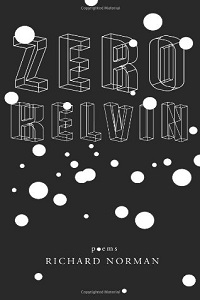
Richard Norman. Zero Kelvin. Windsor: Biblioasis, 2013.
~Reviewed by Rachael Wyatt
Absolute zero, or zero Kelvin, is the unreachable absolute stillness of matter, a theoretical limit-point, the state of matter with no energy, when even the smallest atomic vibrations have stilled. It is, for me, a metaphor for a moment of absolute still oneness with the universe. We can only approach it, never achieve it: the effort required to cool anything to zero Kelvin is astronomical. Richard Norman’s reach within this volume is astronomical as well: he launches musings about the mundane world out through our outer atmosphere toward the moon, toward other planets in our galaxy, toward the sun and distant stars. He muses on the origin of the universe, the philosophical nature of existence, and still gets muddled and mired in the particularity of existence. The energy of this first volume of poetry fights against the very idea of zero Kelvin.
The strength of this collection lies in poems like “Under the Volcano,” where the superposition of a Catholic sacrament (“a round of Extreme Unctions”) over tequila shots with Tabasco launches into a bizarre dreamscape: everything floats upward, clouds boil in the space between skyscrapers, and the speaker sees cities and landscapes as circuitry and “buildings [as] transistors” just before the point of view is interrupted by the banking of a plane. The sweep of this one short poem catches some of the energetic leaps and pace of a lot of the other poems in the volume, but with a balanced sweep of movement that serves its whimsy well. Elsewhere, in a poem like “Voices,” phones are ringing in a station, then a young man is seen through a restaurant window, then the poem shifts into a first-person, plural musing on the expectations inherent to phone communication, and then the poem explodes outward into space governed by special relativity and an implied connection between string theory and the voice coming over the phone. The successes and failures of many of the poems in this volume mostly revolve around the balance Norman strikes between allowing the reader to keep up with his leaps and places where metaphors reach just a little too far.
Richard Norman takes risks in this volume: the leaps sometimes left me behind, and, at times, the ebullience behind the poems exceeded the syntax to which these poems limit themselves. The odd integration of the language of philosophy/astronomy along with the occasional quantum reference, biomedical term, or frame of scientific practice carries the dual danger of alienating the audience because it’s unfamiliar or alienating the audience because it’s all-too-familiar in a very different manner or context. While the “pink contagion of the dawn” is visceral and still surprising, I cannot agree that the “well of hell” is “zero Kelvin,” and its abstract nature only makes the line more opaque. Tantalizing tidbits like the scientific breakthrough of “the Doppler effect observed in blood” is mentioned only in passing: a reporter speaks about it on a TV heard from the other room; whereas, in the poem “Redaction,” Norman knits together new metaphors for the creation of black holes that, while surprising, expound upon one of the most common astronomical tropes of poetry. The energy, ambition, and reach in this volume, while they could be tempered by a few more moments of focus, make me look forward to seeing the development of Norman’s poetry in the future.
Rachael Wyatt is a writer and academic living in Fredericton, New Brunswick.
COOL DOWN THIS WINTER WITH ARC!

